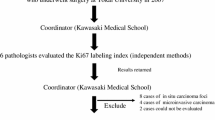Abstract
PURPOSE: In the search for a prognostic discriminant, Ki67 immunoreactivity of colorectal carcinoma was used to see whether this marker correlated with clinical and pathologic parameters and the ultimate prognosis of the patient. METHODS: Fresh specimens from 30 surgically resected adenocarcinomas were obtained and frozen in liquid nitrogen. Slides were immunohistochemically stained with Ki67. Ten randomly chosen fields were examined, and 1,000 nuclei per specimen were counted. The percent positive stained nuclei determined the Ki67 score. Correlation was made with the parameters of Dukes stage, location within the colon, size of malignancy, gender, age, and survival. RESULTS: There was a positive correlation of the Ki67 score for patients with metastatic disease, but no correlation was found to Dukes B and C cases. There was no correlation between Ki67 immunoreactivity and size or location of lesion, patient's age, patient's gender, or whether patient died of disease or developed a recurrence compared with those who survived five years disease-free. CONCLUSION: Ki67 immunoreactivity could not be correlated with clinical and pathologic parameters except for metastatic disease in this study and was of limited use as a prognostic discriminant.
Similar content being viewed by others
References
Bleiberg H, Buyse M, Galand P. Cell kinetic indicators of premalignant stages of colorectal cancer. Cancer 1985;56:124–9.
Kanemitsu T, Koike A, Yamamoto S. Study of the cell proliferation kinetics in ulcerative colitis, adenomatous polyps, and cancer. Cancer 1985;56:1094–8.
Rew DA, Wilson GD, Taylor I, Weaver PC. Proliferation characteristics of human colorectal carcinoma measuredin vivo. Br J Surg 1991;78:60–6.
Risio M, Caverlizza S, Ferrari A, Candelaresi GL, Rossini FP. Immunohistochemical study of the epithelial cell proliferation in hyperplastic polyps, adenomas, and adenocarcinomas of the large bowel. Gastroenterology 1988;94:899–906.
Gerdes J, Schwab U, Lemke H, Stein H. Production of a mouse monoclonal antibody reactive with a human nuclear antigen associated with cell proliferation. Int J Cancer 1983;31:11–20.
Gerdes J, Lemke H, Baisk H, Wocker HH, Schwab U, Stein H. Cell cycle analysis of the cell proliferation associated human nuclear antigen defined by the monoclonal antibody Ki-67. J Immunol 1984;133:1710–5.
Bogden A, Gaboreanu M. Techniques of normal and pathological histochemistry. Bucharest: CERES, 1976:78–9.
Boker DK, Stark HJ. The proliferation of intracranial tumors as defined by the monoclonal antibody Ki67: application of the method to paraffin embedded specimens. Neurosurg Rev 1988;11:267–72.
Gerdes J, Dallenbach F, Lennert K, Lemke H, Stein H. Growth fractions in malignant non-Hodgkin's lymphomas (NHL) as determinedin situ with the monoclonal antibody Ki-67. Hematol Oncol 1984;2:365–71.
Bouzubar N, Walker KJ, Griffiths K,et al. Ki67 immunostaining in primary breast cancer: pathological and clinical associations. Br J Cancer 1989;59:943–7.
Wrba F, Chott A, Reiner A, Reiner G, Markis-Ritzinger E, Holzner JH. Ki-67 immunoreactivity in breast carcinomas in relation to transferrin receptor expression, estrogen receptor status and morphological criteria: an immunohistochemical study. Oncology 1989;46:255–9.
Sheperd NA, Richman PI, England J. Ki-67 derived proliferative activity in colorectal adenocarcinoma with prognostic correlations. J Pathol 1988;155:213–9.
Porschen R, Lohe B, Hengels KJ, Borchard F. Assessment of cell proliferation in colorectal carcinomas using the monoclonal antibody Ki-67: correlation with pathohistologic criteria and influence of irradiation. Cancer 1989;64:2501–5.
Porschen R, Kriegel A, Langen L,et al. Assessment of proliferative activity in carcinomas of the human alimentary tract by Ki-67 immunostaining. Int J Cancer 1991;47:686–91.
Linden MD, Ma CK, Kubus J, Brown RD, Zarbo RJ. Ki-67 and proliferating cell nuclear antigen tumor proliferative indices in DNA diploid colorectal adenocarcinomas: correlation with histopathologic characteristics and cell cycle analysis with two-color DNA flow cytometry. Am J Clin Pathol 1993;100:206–12.
Johnston PG, O'Brien MJ, Dervan PA, Carney DN. Immunohistochemical analysis of cell kinetic parameters in colonic adenocarcinomas, adenomas, and normal mucosa. Hum Pathol 1989;20:696–700.
Author information
Authors and Affiliations
Additional information
Supported by a grant from the Foundation of the Sir Mortimer B. Davis-Jewish General Hospital and the American Physician Fellow-ship.
About this article
Cite this article
Kyzer, S., Gordon, P.H. Determination of proliferative activity in colorectal carcinoma using monoclonal antibody Ki67. Dis Colon Rectum 40, 322–325 (1997). https://doi.org/10.1007/BF02050423
Issue Date:
DOI: https://doi.org/10.1007/BF02050423




